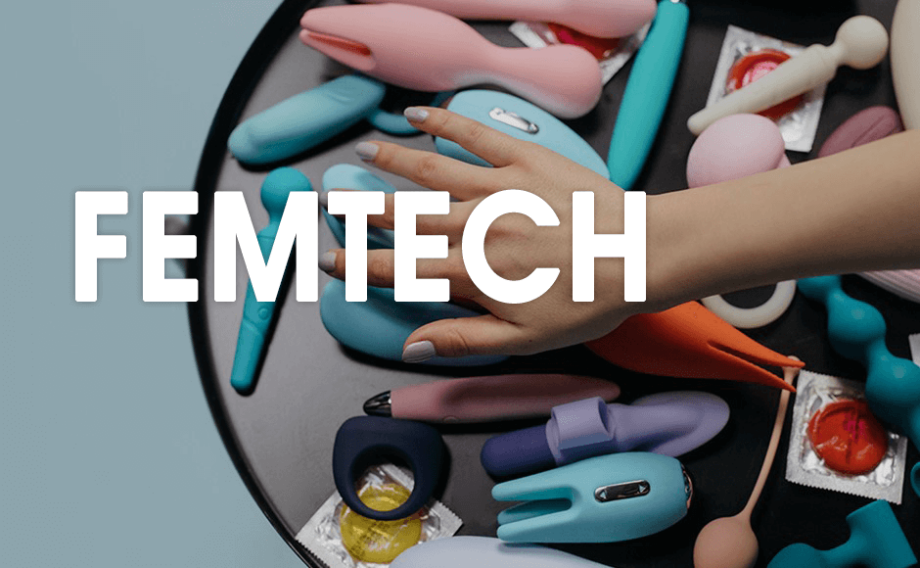Kinkly recognizes that there are lots of people with vulva/vaginas and uteruses who aren't women and that many women do not have these body parts. Many of the quotes in the article are speaking about cisgender women specifically, but we love bodies of every kind and any kind of tech that makes having one healthier and happier.
This article is part of a series around femtech and the people leading the charge in this growing sector. See the femtech series here.
Sextech can loosely be categorized as technological devices and digital platforms that enable and encourage pleasure, intimacy, and sexual well-being. According to Forbes, the sextech industry is slated to be worth an estimated $122 billion by 2024. It is not only facilitating sexual well-being for many but with its focus on addressing pleasure disparities, a new crop of sextech brands are doing wonders for vulva-owners and other historically underrepresented groups.
One of those is the burgeoning femtech industry, which focuses on people with vaginas. The femtech space covers startups that develop period and fertility trackers, pregnancy and neonatal care, diagnostics, sexual health, digital products, and other services that use technology to focus on women's health. The projected worth of the femtech market is estimated to hit $50 billion by 2025.
When Tania Boler founded Elvie seven years ago, the term "femtech" did not exist. (Elvie is the tech company responsible for the Elvie Trainer, a pelvic floor strength trainer, and Elvie Pump, the world's first silent wearable breast pump.)
That the right word hadn't been invented yet stands to reason, Boler points out, as women's health has historically been overlooked in the tech space, compounded by the overall male-centricity of the industry and the cultural norms that have forbidden people with vaginas to talk openly about their bodies.
Read: Why Understanding Our Sexual and Reproductive Anatomy is So Important (and Why 70% of Women Can't)
It wasn't until September 2016, when Ida Tin, CEO and co-founder of period tracking app, Clue, coined the term femtech at Techcrunch Disrupt. She created it in response to seeing products supporting the health of vulva-owners scattered all over the place.
"I thought, they are all related and it would be helpful to see them all as part of a big new business category unfolding," she says. Language is important and helps us to define and categorize.
From the perspective of Rachel Braun Scherl, managing partner and co-founder of SPARK, you can't have a conversation unless you have the vocabulary. "The term 'femtech' at least gives us a vocabulary to start the conversations about vulvas, vaginas, menopause, sexual pleasure, and more – and I know from other people in the space that they think the term is too limiting," says Scherl.
"The term 'femtech' at least gives us a vocabulary to start the conversations about vulvas, vaginas, menopause, sexual pleasure, and more – and I know from other people in the space that they think the term is too limiting,"
What's interesting about the femtech space to Carol Queen, PhD, staff sexologist at Good Vibrations, and particularly the way that it's promoted and talked about, is that it really wants to represent this as a new movement. The reality is that people with vulvas have been developing, marketing and selling sex toys for a long time. Good Vibrations is turning 44 next month; they're the second company in the country to focus on selling sex toys in a female-focused manner. Queen notes that when they first got started, there was no technology to speak of. "Not like the tech toys today that are computer chipped, have lots of modes, or are robotically enabled."
"As I first heard [feminist author] Susie Bright point out, and I don't even know if she was the first to say this, with every new technology that humans developed, if they have any sexual implications, (and many of them do,) then people will quickly adopt the sexual implications of the toy," says Queen. "We had photography, then porn pictures. Phones? Phone sex. If there's a way to turn the technology in the direction of humans' favorite hobby, it will be done."
Queen points out that there have been earlier iterations of femtech that were different technologies from what is currently thought of as femtech. "But the overarching idea that women have had a particular role in this adult space? I don't want people to think they just invented that a few years ago, because that wouldn't be correct," says Queen.
"But the overarching idea that women have had a particular role in this adult space? I don't want people to think they just invented that a few years ago, because that wouldn't be correct,"
Most femtech founders have vulvas. But most venture capitalists have penises. Tin knew that having a dedicated umbrella term would help products, services and companies have more visibility and would raise awareness among investors and media. By defining femtech and making the decision to refer to Clue as a femtech company, Tin made it a legitimate concept and opened up a much-needed discussion about women's health.
"This has paved the way for femtech conferences, femtech portfolios, and femtech investors," Tin notes. "Most importantly, it has taken the development of femtech from a fringe movement to a lucrative option that investors can take seriously."
"Most importantly, it has taken the development of femtech from a fringe movement to a lucrative option that investors can take seriously."
Dainis Graveris, certified sex educator and relationship expert at SexualAlpha notes that it has helped many startup companies, especially those run by vagina-owners, to unify and promote women's health in the health technology sector.
At the very least, it's a conversation starter. Talking about vaginas and intimate health has always been "hush-hush" and even taboo in most societies, but how can we design products that make lives easier if no one talks about these issues? asks Boler.
Read: 4 Women-Led Sex Toy Companies That Are Making Sex Better for Everyone
"If we don't talk about them, we can't create the technological innovations that dismantle them! Having a term like 'femtech' is necessary because it encourages us to engage in these discussions, shift people's views, and educate both women and men on important – often intimate – topics," Boler said. She sees this as an excellent opportunity to drive real change in the culture at large while addressing the often-ignored needs of 50% of the population.
"Having a term like 'femtech' is necessary because it encourages us to engage in these discussions, shift people's views, and educate both women and men on important – often intimate – topics."
"At a minimum, even if we don't all mean the same thing by the term, we're asking questions and having conversations," says Scherl. "We continue to share the statistics that dispel the myth that these markets are a niche." She points out that not only do these big problems and their emerging solutions affect half the population, people in the space of femtech are solving enormous issues, such as:
With the boom in femtech, Boler has seen the convergence of three trends: "We're all talking more openly about our bodies; innovations in sensor technology have meant that real-time body monitoring is now possible; and finally, our perceptions of health and wellness have dramatically changed from one of doctor-patient to individuals taking control of themselves," she says.
Andrea Oliver Garcia, CEO, and co-founder of Emjoy, the audio-based sexual well-being app, thinks the burgeoning success of the femtech industry boils down to a few things. “Firstly, female empowerment, on the whole, has made huge progress in the past five to 10 years, and this can be seen through pivotal moments such as the #MeToo movement or the #FreeTheNipple campaign,” she says. “Secondly, women are far more comfortable demanding products that meet their needs.”
For Garcia, starting a company in the femtech space as a young, woman-identifying person plays an important role. "Despite having been raised as equals to our male counterparts – at least more so than the generations before us – many of us have grown up and realized that there are still stigmas and misconceptions surrounding our health, bodies and sexuality," she says.
"Despite having been raised as equals to our male counterparts – at least more so than the generations before us – many of us have grown up and realized that there are still stigmas and misconceptions surrounding our health, bodies and sexuality,"
As such, young vulva-owners have begun to take matters into their own hands by creating companies that address these issues. Garcia designed Emjoy to address the orgasm gap. "With every download, we move closer towards creating a future where female sexual wellness is considered as important as mental and physical well-being," says Garcia.
“The focus of technology on women’s health has paved the way for more products, services, awareness and conversations around not only common issues such as menstruation, but also untapped challenges that women face, such as menopause and postpartum depression,” says Graveris.
“Femtech allows women to take better charge of their health, sexual wellness and overall well-being when they have access to well-researched, quality products. It can be empowering for women to take control of not only their well-being but also their lives.”
Another advantage of using the term femtech is that it helps entrepreneurs get proper funding. “Many women from low- to middle-income countries are unable to look after their health properly because they don’t have the funds to access the services and help that they need,” says Graveris.
While there has been some divisiveness surrounding the term, Boler believes that the word "femtech" is positive nomenclature that helps dismantle these taboos. "It’s something to be celebrated,” she says. “And as a category name, it’s instrumental, as it allows companies and female founders to have more collective power.”
"As a category name, it’s instrumental, as it allows companies and female founders to have more collective power.”
The term does not come without its drawbacks, though. On of the of the downsides of using it is that it promotes stereotypes. Queen says there has undoubtedly has been a certain amount of sexism in this space. Toys have always been styled and designed with the assumption that a cis-woman would be the primary user, or as a couple, in which a cis-woman would be the primary user. They’re often designed by men who don't have the same parts or insight.
“Parts and insight are not, of course, all it takes to do an amazing job in this space, and proof of that is the Hitachi Magic Wand (now the Original Magic Wand),” Queen points out. “If there was one toy that women, in particular, were mad about for the last 50 years, it's been that one. And it's not because anybody designed it to do that. It’s just that it happened to do it beautifully, and that was a wonderful thing.”
That said, many sex toys are enjoyed by people with varying bodies, body parts and identities.
“There’s very little that’s being designed only for one sort of body or identity, though almost everything the adult industry makes is being packaged that way,” says Queen, who is eager for the day packaging becomes less binary.
Of course, many of these products can be used by intersex, trans, and non-binary people. Issues that might be framed as "women's health issues" can affect body parts that many kinds of people have, and restricting their perceived use to cis-gender women is limiting and unhelpful.
Graveris says the term facilitates a sexist divide once again, and it not only marginalizes women further but also excludes non-binary and transgender individuals. “Some people feel uncomfortable when they are considered only to belong to one category,” he says.
It also doesn’t take into account the extreme variety in women's bodies and sexual health. Deon Black, sex coach and relationship expert at LetsTalkSex.net, knows many cases of period apps largely failing with predicting periods and ovulation. He has also heard of gynecologists trusting too much in these apps as well.
“The problem is that to create a successful femtech app/product, you need to scale, simplify, approximate, mathematicize many variables, with the result that the ‘average’ woman will be fine,” says Black. “But half of them, whose body is not like a robot, will inevitably be getting wrong data or results.”
He adds that if the femtech engineers took the time to make apps and products that work for every single woman, it would be too expensive to manufacture, take too long to design, and not be profitable at all. Which means goodbye femtech. Black cautions women to be cautious with the femtech hype.
Read: Where Are All The Women of Color in Sex Tech?
Graveris sums up: “Despite the rising concerns around women’s health [issues], many people are still unaware of their existence. The femtech sector strives to raise this awareness not only among women but also diverse groups of people. Femtech paves the way for women to easily access information and services that help with an array of health and wellness challenges. These challenges include general health, menstruation, reproductive health, sexual wellness, pregnancy and post-care, fertility, hormonal disorders, and chronic conditions.”
At the end of the day, Boler thinks it makes financial sense to develop products using empathy. “Women have always known that they deserved more. They just needed brands, thought-leaders and platforms to help lay the groundwork and uncover what they should be learning when it comes to their bodies,” Boler said.
“Women have always known that they deserved more. They just needed brands, thought-leaders and platforms to help lay the groundwork and uncover what they should be learning when it comes to their bodies.”
Her company approaches a real need or issue and innovates around it, placing women at the heart of their designs and engineering. “Next-generation health tech companies like Elvie are creating a parallel healthcare industry tailored to women because we know that the right tool or product has the potential to change lives,” Boler said.
Looking ahead, Garcia doesn’t think femtech will not be viewed as a women-only issue, and investment in this space will be seen as equally important as that we continue to see in the wider healthtech arena. “This will also, no doubt, result in an increased number of exits in the space, whether through M&A [mergers and aquisitons] or IPO,” she says.
Garcia hopes that as the industry continues to grow and develop, and that it will attract and empower even more women to start their own businesses, both in the femtech space and outside of it.
This article was produced in partnership with The Femmys, the first-ever awards celebrating innovation in femtech. Want to apply for an award? Learn more here. Want to attend the (virtual) event? Get on the list to be the first to know when tickets are released.
Ryn Pfeuffer is a versatile print and digital writer specializing in sex, lifestyle, and relationship topics. She got her start in the mid-90s at the Philadelphia Weekly, managing a 10-page section of the newspaper and more than 500 lonely hearts.Her professional stock skyrocketed when she started writing a saucy (and pre-Carrie-Bradshaw-era) dating advice column called “Ask Me Anything.” She appeared regularly on local radio stations and late-night TV as an expert on everything from grooming habits to threesomes.Over the past two decades, her work has appeared in more than 100 media outlets including Marie Claire, Playboy, Refinery29, The Globe and Mail, The Washington Post, WIRED, and Thrillist. She adopted a pseudonym and was AVN’s (Adult Video Network) first female porn reviewer – while penning children’s books at the same time.More recently, she is the author of 101 Ways to Rock Online Dating (2019). She lives in Seattle with her rescue dog, Mimi. You can find her on Twitter @rynpfeuffer or IG @ryn_says




